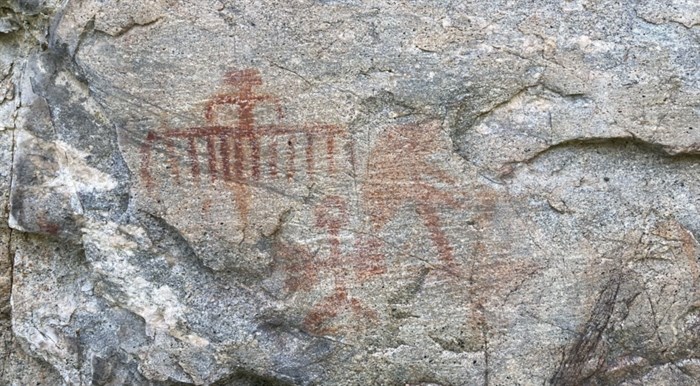
Ancient pictographs from the South Okanagan are seen in this file photo
Image Credit: SUBMITTED
September 12, 2020 - 9:17 AM
CONTENT ADVISORY
A former band Chief and archaeologist hopes First Nations and the public in general will come to appreciate the value of native pictographs to provide a collective safeguard for the treasures, particularly after some were defaced by racist graffiti in Osoyoos last week.
Roxanne Lindley, a former Westbank First Nation Chief, says native rock pictographs represent history, spirituality, or sacred locations.
“When we come upon one, we consider them sacred and revered. What we’re doing now, within a lot of our young people, is we are taking them back to these locations and they are learning about themselves, their identity, their history and the feeling of the land, and all those wonderful connecting healing things that go with it,” she says.
Racial epithets were spray-painted over a pictograph on the Osoyoos Indian Band last week, prompting an angry response from long-time Osoyoos Indian Band Chief Clarence Louie. It's fair to say most people living or visiting the Okanagan have no idea about their cultural value, particularly to First Nations.
READ MORE: Osoyoos Chief calls out 'cowards, racists and low-life scumbags' who defaced ancient pictographs
Pictographs are protected by the archeology and heritage conservation branches, she says.
“It’s a real shame when they are defaced. Repair is costly,” she says, recounting another instance of vandalism where someone set tires on fire inside a cave containing pictographs near Okanagan Lake.
Lindley says within the Okanagan Nation, there will likely be some discussion about shutting off those sites and limiting access.
She says she’s worked in schools with teachers to explain the concept of pictographs with students.
“It’s a wonderful subject in terms of cross-cultural education and teaching. This is where we can make a difference, with youth,” she says.
She says pictographs have been a part of local native culture for thousands of years.
“When you look at the archeological evidence within our territory, you’re looking at a time frame of 15,000 years plus,” she says.

Ancient pictographs from the South Okanagan are seen in this file photo
Image Credit: SUBMITTED
Lindley believes it’s possible pictographs were re-touched through time, especially if one had cultural or spiritual significance.
"I believe there could have been more than one application of ochre or charcoal, or whatever medium they might have used. Our people were scientists when they created them, experimenting with different mediums to see what mixtures would penetrate and last in the porous rock,” she says.
Lindley sees part of First Nations responsibility is to educate the public about the importance of pictographs, but she also notes part of reconciliation is about respect, something the general public needs to understand and embrace.
“From our point of view, it’s about education. It’s not OK to commit that kind of vandalism. It’s a shame that kind of damage happens anywhere,” she says.
To contact a reporter for this story, email Steve Arstad or call 250-488-3065 or email the editor. You can also submit photos, videos or news tips to tips@infonews.ca and be entered to win a monthly prize draw.
We welcome your comments and opinions on our stories but play nice. We won't censor or delete comments unless they contain off-topic statements or links, unnecessary vulgarity, false facts, spam or obviously fake profiles. If you have any concerns about what you see in comments, email the editor in the link above.
News from © iNFOnews, 2020